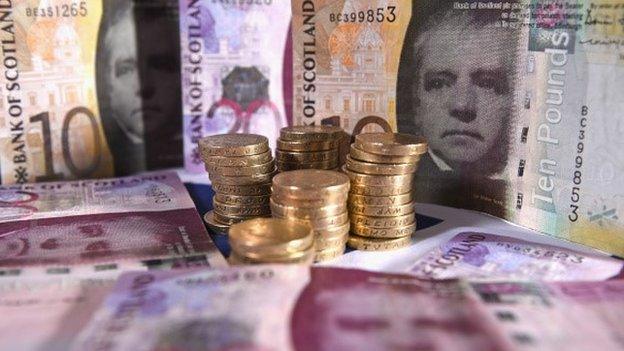Scottish independence issues at-a-glance: Economy and currency
- Published

What powers does the Scottish Parliament currently have and how might they change with independence or further devolution?
This page summarises the implications of the referendum for economy and currency - one of seven different themes. The others are: The , external, , external, , external, , external, , external and broadcasting.
More in-depth analysis on the economy and currency.

At present
Currency: Scotland shares the pound sterling with the rest of the UK. The currency is backed by the Bank of England as a lender of last resort, and the Bank also sets interest rates with the aim of reducing inflation.
Budget: Holyrood receives a three-year funding settlement from the Treasury, which it decides how to spend in devolved matters in an annual budget.
Taxation: Holyrood has powers to vary income tax by 3p above or below UK rate, but they have never been used.
The Scotland Act 2012 gives Holyrood the power to set a Scottish rate of income tax for Scottish taxpayers. As things stand, it is expected to apply from April 2016.

After a Yes vote
Currency: The Scottish government wants a currency union with the UK. It says the deal would "not only be in Scotland's interests" but would also benefit the rest of the UK.
However, First Minister Alex Salmond says there are other options - using the pound without a currency union; a Scottish currency or a "flexible currency" like Sweden or Norway.
All three pro-Union parties have said they would veto a currency union, which they say "would not be in the interests of Scotland or the continuing UK".
They also point to disadvantages of the sterlingisation option and a new Scottish currency.
Budget: The Scottish Parliament would no longer receive a block grant from the Treasury but would raise its own money to spend.
Taxation: A date for reducing corporation tax by up to 3% to stimulate economic activity would be set.
Air Passenger Duty would be reduced by 50% and a "simpler tax system" to reduce costs and cut down on tax avoidance would be set up.

After a No vote
Currency: In the event of a "No" vote, Scotland's currency would remain the same.
Budget: The Conservatives, Labour and Lib Dems have signed a pledge that includes preserving the block grant from the Treasury to the Scottish government.
In their devolution reports:
Labour acknowledged the Barnett allocation would be reduced in proportion to the revenue generated by new tax-raising powers
The Conservatives discussed the need for "a robust and stable long-term mechanism" to calculate the grant
The Lib Dems advocated moving to a "needs-based payment"
Taxation: Labour proposes that MSPs should be able to vary tax by up to 15p, giving them the option of restoring the 50p rate for top earners. They would also be able to cut the 45p rate but only if the basic rate was cut as well.
The Conservatives propose that Holyrood should be given full income tax powers and Westminster should consider assigning a share of Scottish VAT receipts to the Scottish Parliament. The tax-free personal income tax allowance should remain at Westminster, but, after that, the Scottish Parliament would decide on rates and bands.
Lib Dems propose that income tax paid by Scottish taxpayers should be the responsibility of the Scottish Parliament, with the exception of setting the tax threshold and taxation of savings/investments.

The policies under independence are taken from the Scottish government's White Paper on independence, external. Yes Scotland and other Yes campaigners do not necessarily share these positions.
Where Better Together, external has a stance, this has been cited. The separate Labour, external, Conservative, external and Lib Dem, external proposals are taken from their respective reports on devolution.
Both sides' preferred policies would be subject to negotiations following the referendum.
The Scottish government has said that following a Yes vote, arrangements would be in place for full independence from 24 March 2016.
The Better Together campaign has said that following a No vote draft legislation on devolution would be introduced by the end of January 2015.


What would a "Yes or "No" vote mean for Wales and , external, and how would a "Yes" vote affect Northern Ireland?
Will the result lead to more , external and would the town at the centre of Britain have to rebrand?
Does the currency clash matter and how might a change affect the rest of the UK?
The referendum on Scottish independence is on 18 September 2014. Go to the BBC's Scotland Decides page for more detail
